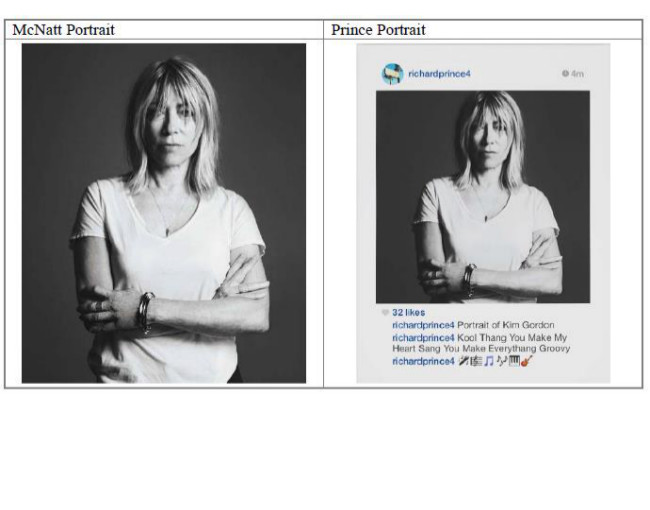
Source: Court file
Take a copyrighted photograph of Sonic Youth bass player Kim Gordon, crop it, and add an Instagram border and a few words of text and emojis. Have you “transformed” it sufficiently to avoid copyright infringement? And is it so clear that it can be decided at the early pleading stage of a lawsuit? Richard Prince thinks so.
Stop me if you’ve heard this story before: Richard Prince, the “appropriation artist,” has been sued by photographer Eric McNatt for copyright infringement in federal court in New York. McNatt’s photography has appeared in hundreds of magazines and advertising campaigns.
Prince used McNatt’s 2014 photograph of Gordon by cropping McNatt’s photograph, surrounding it with his Instagram frame, and adding three lines of text and emojis. According to the complaint, the resulting work was displayed on Prince’s website, Instagram feed, a book, and an exhibition.
A comparison of the McNatt photograph and Prince’s work appears at the top of the page.
Prince moved to dismiss the complaint, alleging a fair use defense. Prince has successfully defeated some copyright claims in the past by focusing on his claimed transformative nature of his works. In his motion, Prince sets the backdrop and bona fides of appropriation art – which the Tate Gallery defines as “the more or less direct taking over into a work of art a real object or even an existing work of art” – by presenting similar appropriations created by Andy Warhol and Pablo Picasso.
Prince contends fair use can be decided with a side-by-side comparison of the two works, and that his work is transformative of the original because it may be viewed as a “commentary on the rise and popularity of social media,” as compared to McNatt’s photograph, which he claims conveys a different message – the “‘cool’ and ‘tough aloofness’ of a rock music icon.”
In response, McNatt alleges all of the four fair use statutory factors favor his position – purpose and character of the use, the nature of the original work, the amount and substantiality of the portion used, and the effect on the market for the original.
Addressing Prince’s transformation claim, McNatt notes the photograph in each work is identical – it is the same black and white photograph of Gordon without “distortion, modification, or obstruction.” McNatt further suggests that even if there is a new message in Prince’s work, it did not come about by a transformation of McNatt’s photograph: “There is no transformation of McNatt’s work such that it would convey the [new] message.”
The motion is set to be decided by Judge Sidney Stein of the Southern District of New York.
Mike Nepple is a partner in Thompson Coburn's Intellectual Property group. The headline is with apologies to one of his favorite bands, the Violent Femmes, “Prove My Love,” from their self-titled 1982 album, Violent Femmes.







